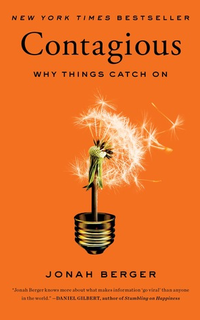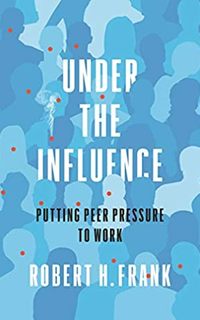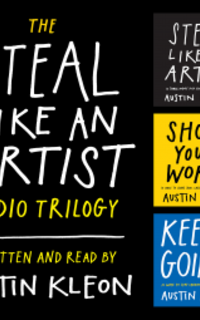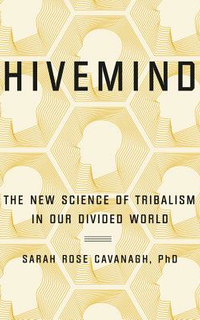Collection
Weekly Reading List 5.16.22
The new weekly reading list is up. This week, I finished 6 books (technically 8 lol) by some amazing authors! Be warned that the list starts with 2 harsh reviews though 😬
- Curated in Weekly Reading List 5.16.22
I swear on everything holy that I tried so hard to like this book. Much like his previous book, Dave Rubin has this insane ability that I’ve never seen from any other author. This ability is to make a reader like me who dislikes him but wants to understand think, “Alright. He’s saying some good stuff. Maybe he’s not so bad,” and then within paragraphs say something ridiculous, an outright lie, or extremely polarizing. Sometimes, it’s all of the above.
I’ll start with the good. If you scrape away all of the garbage from this book, Dave has some great advice for people. The overarching topics of each chapter is solid, like knowing how social media manipulates us, why you should be skeptical of certain information, and the value of being an independent thinker. If I’m being extremely optimistic, I think/hope that some of his conservative readers will gain something from value from the self-help aspect of the book.
Now, onto the bad.
My primary issue with Dave Rubin is that he’s full of shit. I don’t know if writer Dave Rubin is the bullshitter or the YouTube Dave Rubin is the bullshitter. But, they aren’t the same people. In his books, he comes off far more rational and tolerant (I use the word tolerant very loosely) than he does on YouTube. Both versions do pander to the right, but writer Rubin is a bit more chill and doesn’t spread as much misinformation or omit as much information.
I binged this book in less than a day because of his ability to bait me in and think he’s going to impart some wisdom before saying something extremely silly. To give you an example, at one point he’s discussing the benefits of becoming self-sustaining by starting a garden with his husband and learning some survival skills. Well, that’s cool. I’ll never criticize someone for trying to go outside some more or learn some skills. But then he literally says that doomsday preppers aren’t paranoid, they just like to be prepared. And no, not the rational preppers. He’s referring to the ones who believe the apocalypse has been coming any day now for the last 30 years.
The book obviously panders to the right and talks a lot about the terrors of wokeism. I’m not sure if that’s necessarily worth criticizing anymore because it’s the norm. You’ll rarely find authors who aren’t academics who legitimately try to argue for and against both sides. Even though I don’t like it, it’d be a real “Rubin move” of me to act like it’s only the Right who does this. Throughout the book, he’ll regularly criticize the left and left-wing media while omitting as much information as possible about his side. And in case you’re wondering, yes, he does downplay the January 6th insurrection.
Lastly, just because I think it’s funny/sad, I think it’s important to mention how much name dropping he does in this book. Every few paragraphs (or less), he can’t help but name drop people he knows or has met like Donald Trump, Tucker Carlson, Ben Shapiro, Larry King, and others to signal, “See! I’m popular!”
This is one of the longers reviews I’ve written. I think it’s because Dave Rubin is one of a kind, and that absolutely fascinates me. So, should you read this book? Hell yes. If nothing else, you’ll enjoy trying to understand wtf is going on in this guy’s head.
Oh, I almost forgot that at one point in the book he recommends the reader turn to disgraced lawyer and former mayor Rudy Giuliani as a source for inspiration and find your inner bravery.
- Curated in Weekly Reading List 5.16.22
I feel terrible writing this review, and it breaks my heart. This book just isn’t that great.
Some backstory, I used to love this book. I’ve worked in marketing for years, and I love psychology. This was the first book that introduced me to using psychology for marketing based on “evidence-based” research. Jonah Berger is a professor and Wharton, and I’ve read all of his books. I decided to give this one another read as a refresher since it’s been a few years, and I was just in shock reading some of the nonsense in this book.
So, what’s my problem? Well, learning about the difference between good and bad science is what did it. It ruined this book for me. Social sciences already have a bad reputation, but the studies used in this book are absolutely ridiculous. As I was reading, I was like, “There’s no way in hell that this would have consistent results.” Aside from that, there was so much selection bias and survivorship bias in this book that it was bonkers. The issue is that so much of what Jonah Berger teaches is subjective as well, so it’s extremely hard to falsify.
In between the bad science, there’s a lot of practical advice for getting people to talk about your “thing”. The issue is when it tries to use research to back it up. If you want to read it, go for it. I don’t think it’s a waste of time, but just be extremely skeptical of the research used in this book. And now, I’m going to reread his other books to see if they’re just as bad.

- Curated in Weekly Reading List 5.16.22
Hot damn is this book good! I love Robert Frank’s books. This was my second time reading this particular book, and I remember not really enjoying it the first time around. This time, I absolutely loved it. I think the first time I read it was around the time that I was reading a ton of books about conformity, so I was bored with the topic. I also don’t think I understood the concepts too well my first time reading the book as well. As I read the book again, I just kept thinking about how amazing it is.
Robert Frank combines economics, evolutionary psychology, and some philosophy to explain how peer pressure can be used for good. He cites a ton of research about how we influence each other, which leads to how we can make this world a better place. He uses easy-to-grasp examples like how we influence each other to smoke and do other unhealthy activities, and how what’s worked to slow the spread of these behaviors. Then, he transitions that into making the world better to reduce the effects of climate change and a practical idea for taxing the wealthy, and much more.
I loved this book oh so much. Go get it now, and tell all of your friends.

- Curated in Weekly Reading List 5.16.22
These are a must-read for creatives. Whether you’re a musician, a writer, painter, or any other type of artist, these books are great. I’m an audio listener, so I was able to listen to them all together, but they’re sold as individual physical books as well. Austin Kleon gives great advice and insight about getting inspired, sitting down and putting in the work, and not giving up. You’ll even get some ideas for marketing yourself. I read these a couple years ago but decided to revisit them, and they definitely hold up.

- Curated in Weekly Reading List 5.16.22
I’ve read over 90 books in 2022, and this book is definitely in my top 5. Maybe even top 3. I absolutely loved Seth’s previous book Everybody Lies and had no clue he was working on a new book, so this was a pleasant surprise. For those who are unfamiliar with Seth’s work, he dives into data to debunk a lot of conventional wisdom and help us see the truth that’s often hidden by our biases and other cognitive shortcuts. His previous book was more about helping us see the world through a clearer lens, but this one is much different.
Seth brands this book as self-help, but I don’t even think that category does the book justice because it covers so much. Yes, if you read this book, I guarantee your life will get at least a tiny bit better if you take in what he’s showing with the data, but it also helps us take a look at how we all have different advantages and disadvantages. The book covers what the data really says about what makes for long-lasting, great relationships, the biggest factor when it comes to children becoming successful, and how Seth gave himself a makeover using data to make himself more attractive.
Since I’m obsessed with the topics of skill, success, and luck, my favorite two chapters covered these topics. A lot of books either don’t cover both sides of this debate or don’t do a great job of doing so. I think Seth nailed it by discussing how luck plays a big role in success, but it also takes hard work and taking advantage of opportunities that come your way.
I could talk about this book all day, but this is all I’ll say for now. Hopefully, it has interested you enough to go get a copy ASAP.
- Curated in Weekly Reading List 5.16.22
When I had the internet come after me in 2019 and had thousands of strangers attacking me and threatening my family, I wanted to understand what was going on. I started reading every book I could about group psychology and tribalism, and fortunately, this book from Sarah came out later that year. I loved it when I first read it and decided to give it another read because since surviving that experience, I still see tribalism everywhere, so I wanted to see what the book was like looking at it through a new lens. I can definitely say that this book is just as good, if not better, than the first time I read it.
Sarah Rose Cavanaugh does an incredible job building upon various topics to give you a full scope of why we’re so groups. She discusses biology, evolutionary psychology, and much more. I love the various studies she covers and how she challenges some conventional wisdom about tribalism to give a fresh perspective. I’ve read dozens of books on this topic since 2019, and this book is still unique, which is great because a lot of books repeat the same studies and information. If you’re interested in learning more about this topic, this book is absolutely worth the read, and I can’t wait for Sarah’s next book.


